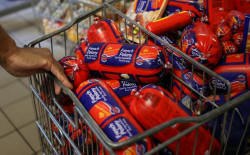|
 South
Africa's popular sandwich shops bear brunt of listeria
scare South
Africa's popular sandwich shops bear brunt of listeria
scare
 Send a link to a friend
Send a link to a friend
[March 07, 2018] By
Sisipho Skweyiya
SOWETO, South Africa (Reuters) - As South
Africa grapples with the world's worst listeria outbreak, it is small
mom-and-pop stores that dot places like the black township of Soweto
that are taking a financial hit as customers fear for their lives.
|
|
 Ntsintsi's Fun Food's popular "kota" sandwich - a hollowed-out
quarter loaf filled with spicy mango condiment, french fries and a
popular ready-to-eat cold meat called polony - has to undergo a
makeover after health authorities traced the listeria outbreak to a
polony factory. Ntsintsi's Fun Food's popular "kota" sandwich - a hollowed-out
quarter loaf filled with spicy mango condiment, french fries and a
popular ready-to-eat cold meat called polony - has to undergo a
makeover after health authorities traced the listeria outbreak to a
polony factory.
"We have to change our game. But the problem we're going to have is
affordability - don't forget French (polony) and viennas (hot dogs)
are the cheapest things that you can get," said Thabang Matomela,
manager at Ntsintsi's.
"But now if we have to reinvent the kota and have a prego (marinated
beef) steak, or have even fish in it, although it did have it, which
means the price is going to a bit high. Now who's going to afford it
again?"

Health minister Aaron Motsoaledi said the source of the disease,
which has killed 180 people since December last year, was found
after pre-school children fell ill after eating polony, which is
made from cooked ground meat, similar to American baloney or a
cheaper form of Italian mortadella.
Motsoaledi urged South Africans to not eat any processed meat even
though the department's agency ordered a recall of three cold meat
products that include polony, prompting a frenzied clearing of
shelves by retailers.
The U.N. World Health Organization called the outbreak the largest
ever recorded globally, after 948 cases were reported since January
2017. Listeria causes flu-like symptoms, nausea, diarrhea and
infection of the bloodstream and brain.
[to top of second column] |

Neighboring states also acted swiftly. Kenya, Zimbabwe and Zambia
banned imports of South African processed meat, dairy products,
vegetables and fruit. Mozambique and Namibia halted imports of the
processed meat items and Botswana said it was recalling them. Malawi
stepped up screening of South African food imports.
"I'm scared for the kids more than anything. I'm scared to give it
to them because I heard that it's been around for a while, so when I
saw it on TV, I realized even more that it's dangerous," Tshepiso
Mpelane, a concerned parent said.
However, among those who eat it, polony - also a staple in school
lunch boxes - is royalty in sandwiches and removing it from the menu
would be an assault on the way of life.
"Listeriosis? What's that?" said Linda Mwansa a 22-year-old mobile
phone saleswoman in the Zambian capital Lusaka. "We don't have such
things in Zambia and I am not going to stop eating polony just
because there are problems far away in South Africa."
(Additional reporting by Chris Mfula in LUSAKA; Writing by Tiisetso
Motsoeneng; Editing by James Macharia and Peter Graff)
[© 2018 Thomson Reuters. All rights
reserved.] Copyright 2018 Reuters. All rights reserved. This material may not be published,
broadcast, rewritten or redistributed.
Thompson Reuters is solely responsible for this content.
 |